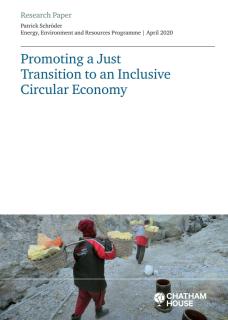
Since 2017, annual global primary resource extraction and use have exceeded 100 billion tonnes per year and estimates by the International Resource Panel indicate that, by 2050, annual global material use could amount to between 170 billion and 184 billion tonnes – an unsustainable level that increases global environmental risks. Today, only 8.6 percent of the resources and materials in the global economy are reused or recycled. A transition to a circular economy is required to move away from the current linear economic model of ‘take–make–throw away’.
This transition is crucial for reaching the environmental goals of the 2030 Agenda for Sustainable Development and to achieve countries’ climate targets as set out in the 2015 Paris Agreement. In the context of these two critical multilateral undertakings, this report explores how 'just transition' and social equity may be achieved through policy and practices. It introduces the concept of 'just transition', including principles, origins, and applicability in climate action. This paper also provides a concept of 'just circular economy transition' and its impact on employment.
